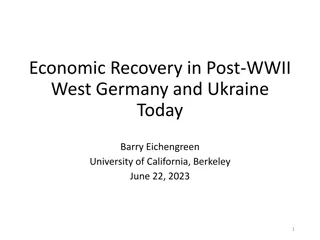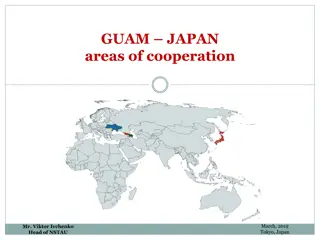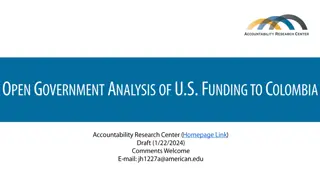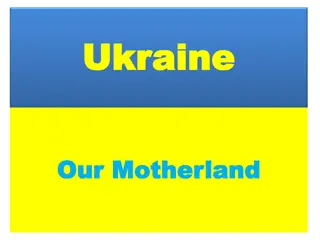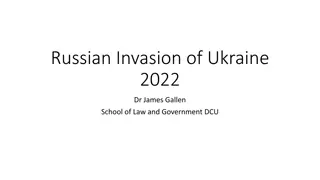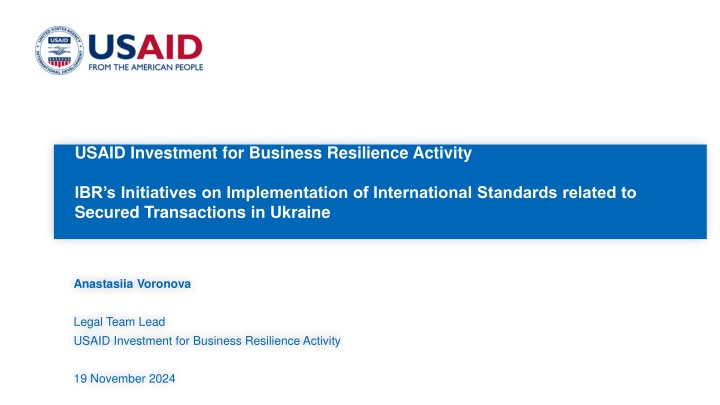
USAID Investment for Business Resilience Activity in Ukraine
With a focus on implementing international standards related to secured transactions in Ukraine, the USAID Investment for Business Resilience Activity aims to increase finance accessibility for enterprises by collaborating with financial intermediaries. Through market regulation, transparency, and facilitating new investments, the program works towards boosting domestic sales, exports, and job opportunities in Ukraine. Key initiatives include EU approximation, adoption of new factoring frameworks, combating unfair trade practices, and improving access to finance for SMEs.
Download Presentation

Please find below an Image/Link to download the presentation.
The content on the website is provided AS IS for your information and personal use only. It may not be sold, licensed, or shared on other websites without obtaining consent from the author. If you encounter any issues during the download, it is possible that the publisher has removed the file from their server.
You are allowed to download the files provided on this website for personal or commercial use, subject to the condition that they are used lawfully. All files are the property of their respective owners.
The content on the website is provided AS IS for your information and personal use only. It may not be sold, licensed, or shared on other websites without obtaining consent from the author.
E N D
Presentation Transcript
USAID Investment for Business Resilience Activity IBR s Initiatives on Implementation of International Standards related to Secured Transactions in Ukraine Anastasiia Voronova Legal Team Lead USAID Investment for Business Resilience Activity 19 November 2024 1
About our Activity USAID Investment for Business Resilience Activity Ukraine Jurisdiction July 2022 July 2027 Duration $93,300,000 Project contract Increasing the supply of finance to enterprises by working with a wide-range of financial intermediaries including banks, leasing, insurance, and investment companies, and others that mobilize funds and channel them for productive investments; Providing direct financial and technical assistance to enterprises that have high potential to increase domestic sales and exports and to create new employment opportunities for Ukrainians; Helping businesses to obtain access to a variety of financial products (loans, leases, insurance policies) and increased access to blended finance on reasonable terms to support their businesses. The IBR Activity s primary objectives: COMPONENTS 1-2: Market Regulation and Supervision. Financial Infrastructure. COMPONENT 3: Private Sector Intermediaries and Facilitators. COMPONENT 4: Transparency and Communications. COMPONENT 5: New Investments Facilitation. Organization: USAID INVESTMENT FOR BUSINESS RESILIENCE ACTIVITY 2
IBRs Initiatives on Implementation of International Standards related to Secured Transactions in Ukraine: Snapshot Expected Results: EU approximation and International Standards Implementation Achieved Side activities Streamlining adoption of New Factoring Framework in Ukraine Long-awaited reform, among first jurisdictions to draft its local law based on UNIDROIT Model Law on Factoring IBR and engaged experts are working on expert opinion on the Draft Law Late Payments and Unfair Trade Practices Implementation of EU Directives 2011/7 and 2019/633 Draft Law combating unfair trade practices used against SMEs by bad-faith retail is presented to the public eInvoices Implementation of EU Directive 2014/55/EU and EU Standard on eInvoicing EN-16931 A study on eInvoice implementation in Ukraine was prepared and will be presented in December 2024 Gap Analysis on Financial Leasing Regulation in Ukraine Analysis of current leasing legislation Alignment with EU countries approaches Assessment against best international standards and practices, recommendation based on such assessment Access to finance for SMEs provided NBFIs role as finance providers improved USAID Investment for Business Resilience Activity 3
Late Payments and Unfair Trade Practices When conducting interviews with market participants and banks/factoring companies, we noted that one of the key problems for factoring development is the issue of late payments and unfair trade practices (such as short notice cancellation of orders for perishable products, unilateral changes to agreements, commercial retaliation). USAID IBR, together with the Antimonopoly Committee of Ukraine, developed a draft law combating unfair trade practices (including late payments), which was presented for public discussion in July 2024 (UTP Draft Law). Draft Law reflects EU regulations (Directive 2011/7/EU of 16 February 2011 on combating late payment in commercial transactions and Directive 2019/633/EU of 17 April 2019 on unfair trading practices in business-to-business relationships in the agricultural and food supply chain). Legislative framework combating late payments and unfair trade practices will unlock an average of UAH26 31 billion (approximately USD 630-750 million) of net working capital for suppliers between 2024 2028. This would result in suppliers saving a collective UAH5.0 5.7 billion per annum (approximately USD 120-138 million) in financial costs between 2024 2028. USAID INVESTMENT FOR BUSINESS RESILIENCE ACTIVITY 4
E-Invoices Implementation i The invoicing system in Ukraine is currently heavily dependent on paper documents (approximately 70%), thus causing inefficiencies, excessive processing costs (surpassing 1% of GDP), environmental damage, and a higher likelihood of tax evasion and fraud. Problems are further exacerbated by the lack of invoice legal status (not considered as proof of sale) and standardization, complex electronic document handling requirements, and the lack of public infrastructure for e-invoice exchanges. These factors make it difficult to assess the receivables and protect the factor from double-financing and other fraud. E-Invoice Phasing E-Invoice financing opportunities Milestone I With digital and standardized invoice data, it's easier for financial institutions to offer invoice financing solutions (factoring, e-Supply Chain Finance) e-Invoice is mandated in B2G/G2B (symmetrical mandate, for regulated purchases & auctions) Milestone II Full visibility into the invoice details, reducing risk and therefore potentially reducing financing costs. E.g., implementation of e-invoicing in Italy was accompanied with increase in the volumes of reported factoring E-invoice is mandated for all large suppliers (symmetrical mandate), public sector buyers (asymmetrical mandate optional for suppliers) and some regulated industries e-Invoicing can enable related technology developments such as automated payments, accounting, and expense management solutions, among others Milestone F E-invoice is mandated for all VAT subjects (symmetrical mandate) USAID INVESTMENT FOR BUSINESS RESILIENCE ACTIVITY
Gap Analysis on Financial Leasing Regulation in Ukraine Substantial changes in Ukrainian non-bank financial leasing regulation were introduced starting from January 01, 2024, which in general resulted in more stringent regulation of the non-bank financial leasing sector. This resulted in significant market concerns, especially from the players that do not belong to banking groups. Based on studied four models of leasing regulation in the EU countries, some recommendations that may positively affect the development of the leasing market in Ukraine were prepared and presented to the local regulator: Taxation Regime Some possible taxation regime improvements may cover: Expanding the scope of the currently existing accelerated depreciation scheme Assess whether there are tax benefits (if any) provided in the applicable law specifically for bank loans as compared with financial leases Mitigate risks associated with VAT taxation of the exchange rate difference of the lease payment Risk Management Regulation should require only essential self-regulatory measures, without being excessive Private Law Considerations Enforcement framework should be improved, some examples below: Introduction of injunctive relief measures like advance relief measures under Cape Town Convention (to introduce preservation, transfer of possession or the outright sale of the leased asset ) Reduce the standard of proof for lessors seeking application of injunctive relief Market Entry and Capital Requirements Prospective applicant shall provide just proof that the shareholder has secured the necessary amount of funds for payment of minimum share capital amount at the licensing stage Minimal capital amounts are calibrated downwards to objectively reflect the unexpected losses of leasing USAID INVESTMENT FOR BUSINESS RESILIENCE ACTIVITY


